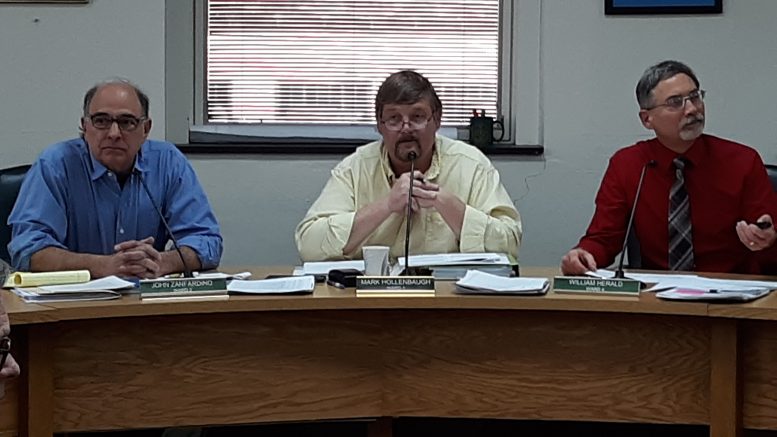By JAN LARSON McLAUGHLIN
BG Independent News
As if plastic bag legislation in Bowling Green wasn’t controversial enough already, another item was added to the cart Monday evening. Of the three-member City Council committee working on plastic bag legislation, one thinks citizens should vote on the issue, one thinks council should decide the matter, and one is somewhere in the middle.
After taking public comment on the issue, council member Bill Herald presented his 32-page PowerPoint on how a policy could be formulated. He suggested that council come up with proposed legislation that citizens could vote on in November.
“The citizens would have the responsibility to vote it up or down,” Herald said.
At that point council member John Zanfardino interrupted Herald’s presentation.
“I’m not agreeing to that,” Zanfardino said.
The job to pass legislation regulating single-use plastic bags belongs to council, he said.
“We need to have the courage to do that,” Zanfardino said.
Herald objected to that characterization, and said putting the issue on the ballot was “not shunning our duty.”
“The citizens then have the right to say what kind of city do they want to be in,” Herald said.
The council committee is holding multiple meetings to hear comments from the public. And if citizens object to the legislation, they can petition to put it on the ballot, Zanfardino said.
Zanfardino thanked Herald for his comprehensive presentation, but added, “I want to strongly say I think council needs to address this. You can’t hand this off. That’s our burden.”
The chairman of the council committee – Mark Hollenbaugh – did not weigh in on the issue.
“This is in no way close to final,” Hollenbaugh said of any plastic bag legislation. “We can duke it out” as discussions continue.
The goal of the Community Improvement Committee is to determine if there are recommended actions which can reduce or eliminate single-use plastic bags in the city.
Herald said any plastic bag legislation must be a phased-in, multi-faceted comprehensive plan involving citizens and community groups. If passed by voters this fall, it would not be implemented until December of 2020.
The legislation must balance the city’s desire to be a good steward of the environment, while not unduly inconveniencing citizens or adversely affecting businesses, he said.
This could be an opportunity to showcase Bowling Green as a community that thoroughly tackles problems in a kind-hearted, balanced and innovative way, Herald said.
“This would be a good way for people to think of Bowling Green,” he said.
That sentiment was stated by Joe DeMare during the public comment portion of the meeting. He mentioned the new “branding” efforts being undertaken by the city.
“It says we’re BG – beautiful, bold and green,” he said. “It’s hard to be green” when there are plastic bags blowing about on trees.
“Do we continue to lead,” DeMare asked, referring to the city’s focus on green energy from wind turbines and solar panels. “We’re justifiably proud of those accomplishments.”
But not everyone believes a ban on plastic bags is the right approach.
Norm Heineman said he is not a fan of the oil industry and not a climate change denier. But he defended plastic bags from retail stores as the “most useful item in my home.” The bags are cheap, waterproof and don’t fall apart.
“I feel bad for the plastic bag,” he said of the much maligned item.
The issue is a “matter of perspective,” Heineman said. Yes, there may be some albatross, seagulls or turtles harmed from discarded plastic bags or straws. But everyday, there are countless cattle and chicken slaughtered for human consumption.
Heineman said he is willing to pay 5 cents per plastic bag at the grocery. Ideally, the plastic industry will someday make the bags biodegradable. But until then, he would rather pay for plastic bags.
He could bring his own cloth bags, Heineman said. But he would likely forget them – which would create an even bigger carbon footprint when he had to drive home to retrieve the bags.
But DeMare’s perspective was different – especially after having the flu lately and being cooped up watching “Blue Planet 2.” The show told in detail the human impact on oceans.
“Literally, what we do here in Bowling Green today is going to have worldwide reparations,” DeMare said. “We are taking actions that are literally destroying these beautiful ecosystems.”
Other nations and regions have already taken steps – such as the European Union, which banned plastic bags two years ago and is now preparing to ban all single-use plastic.
“This is not that inconvenient,” DeMare said.
James Egan talked about other efforts to reduce single-use plastic. San Jose saw a 76 percent reduction in plastic being found in waterways after it banned single-use bags at checkouts.
Washington, D.C., adopted a 5 cent fee and saw usage drop by 60 percent, Egan said. The city is now considering a complete ban on single-use plastics.
“I just want to help,” Egan said.
Now would be a great time for Bowling Green to get on board, said Beverly Elwazani.
“I think we have to decide if we want to be in the forefront of things or dragging along behind,” she said.
Elwazani said she has heard from several people bemoaning the fact that they use the plastic bags for tasks such as cleaning cat litter or picking up dog poop. She suggested people instead try liners from cereal boxes or purchase compostable bags.
And old T-shirts can easily be turned into reusable cloth bags for shopping.
“I guess we’ll just get creative when they aren’t here for us to use,” she said. Bowling Green shouldn’t let “what ifs” stop it from doing the right thing, Elwazani added. “We’d all figure out how to get along without them.”
The next meeting on the plastic bag issue will be held May 6, at 6 p.m., before a City Council meeting.

